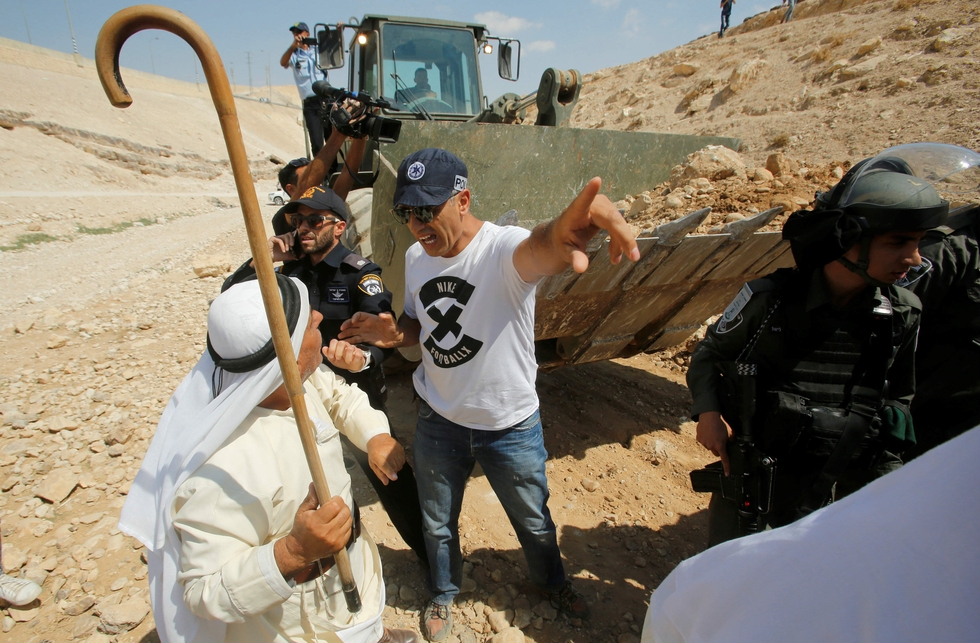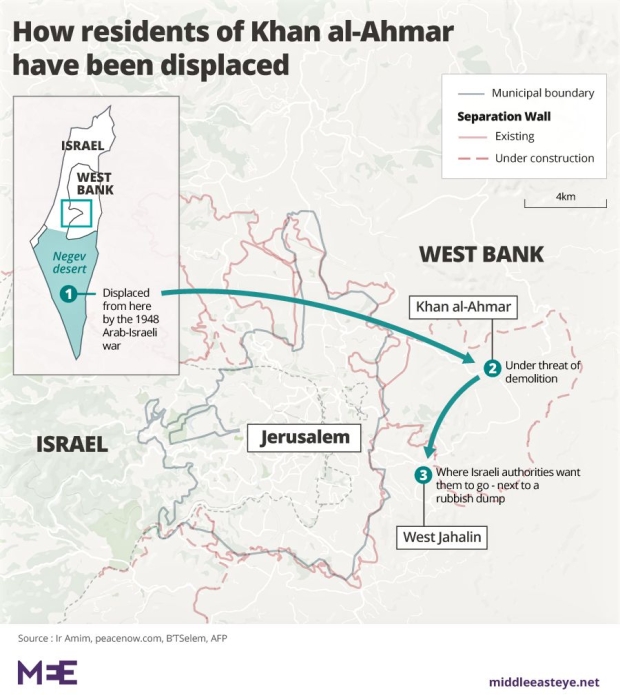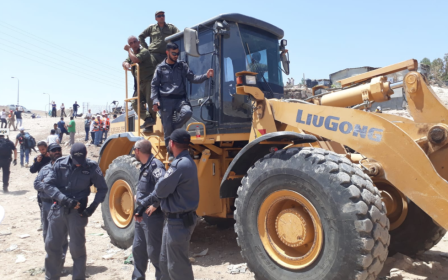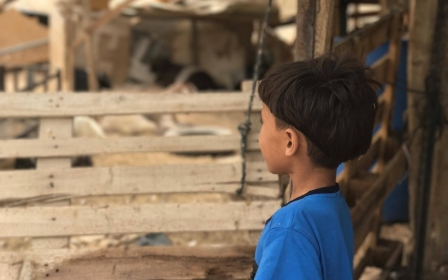The demolition of Khan al-Ahmar: Deadline passes for Israeli bulldozers to move in

Israeli forces are expected to raze the Bedouin village of Khan al-Ahmar and evict nearly 200 Palestinian residents after approval for the plan officially came into effect on Tuesday.
Israel's Supreme Court has twice ruled in favour of demolishing the village, first on 24 May and again on 5 September, following a desperate appeal by the occupants.
Abu Khamis, a resident of Khan al-Ahmar, told Middle East Eye: “We came here after they [Israel] kicked us out of our homelands during the Nakba. Now they want to kick us out of this land, where we have lived for more than 60 years."
By removing Khan al-Ahmar, the authorities will be able to construct units linking the illegal settlements of Kfar Adumim and Maale Adumim with East Jerusalem in the Israeli-controlled Area C, splitting the West Bank in half.
Now they want to kick us out of this land, where we have lived for more than 60 years
- Abu Khamis, resident
Amnesty International has called the Israeli plan a "forcible transfer" and "war crime".
"After nearly a decade of trying to fight the injustice of this demolition, the residents of Khan al-Ahmar now approach the devastating day when they will see their home of generations torn down before their eyes,” Amnesty's statement said.
"This act is not only heartless and discriminatory; it is illegal. The forcible transfer of the Khan al-Ahmar community amounts to a war crime. Israel must end its policy of destroying Palestinians’ homes and livelihoods to make way for settlements.”
Notices handed out
Israeli forces handed out notices on 23 September to the residents of Khan al-Ahmar, telling them to clear and demolish their homes by 1 October or else they will be forcibly removed.
"By the High Court decision, you must demolish all buildings within the Khan al-Ahmar no later than 1 October 2018" the notice read. "If you refuse, the authorities will enforce demolition orders as per court decision and the law."
Palestinian and international solidarity activists have flocked to the village to back the residents, opposing Israeli forces, holding meetings and building symbolic houses that have been demolished by the authorities.
The Israeli army has also used force to disperse protests in Khan al-Ahmar, which blocked the road leading to the town, injuring and arresting residents and activists.
Khan al-Ahmar is located on the eastern desert hillside of Jerusalem, beside an Israeli highway that leads to the Dead Sea, in part of the West Bank, which international law considers as illegally occupied by Israel for the past 50 years.
The 35 families who live in Khan Al-Ahmar are from the Jahalin tribe, a Bedouin family expelled from the Naqab desert - also referred to as the Negev - after the 1948 Arab-Israeli war.
They refuse to leave their homes, which are little more than shacks built of tin and wood - even the community school is a built out of rubber tyres.In July the authorities said that the plan was to relocate the residents of Khan al-Ahmar to an area about 12km away, near the Palestinian village of Abu Dis. But the new site is the former Jerusalem municipal garbage dump; another site that was offered was in the vicinity of a sewage plant close to the city of Jericho.
A history of demolition
Khan al-Ahmar is not the first community in the West Bank to be earmarked for demolition and its residents forcibly evicted.
Since 1967, Israel has demolished more than 50,000 Palestinian homes and structures in the West Bank and East Jerusalem, according to Amnesty.
The first to be razed were the Palestinian villages of Emmaus, Yalo and Bayt Nuba, which were home to around 4,500 Palestinians, in the Latrun hilltop area between Jerusalem and Jaffa.
That same year, Israeli forces and bulldozers destroyed the 770-year-old Moroccan Quarter inside the walls of the Old City of Jerusalem and evicted its 660 residents to pave a way to what is now the Western Wall Plaza.
New MEE newsletter: Jerusalem Dispatch
Sign up to get the latest insights and analysis on Israel-Palestine, alongside Turkey Unpacked and other MEE newsletters
Middle East Eye delivers independent and unrivalled coverage and analysis of the Middle East, North Africa and beyond. To learn more about republishing this content and the associated fees, please fill out this form. More about MEE can be found here.





